Peter MALONE
Saturday, 18 September 2021 19:25
Sherlock Holmes and the Secret Weapon
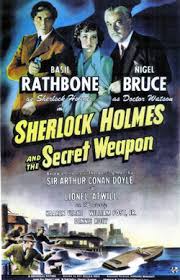
SHERLOCK HOLMES AND THE SECRET WEAPON
US, 1943, 80 minutes, Black and white.
Basil Rathbone, Nigel Bruce, Lionel Attwill, Denis Hoey.
Directed by Roy William Neill.
Sherlock Holmes and the Secret Weapon is based on Conan Doyle's story, 'The Dancing Men.' It is updated for World War Two and this adventure with Basil Rathbone and Nigel Bruce is part of the war propaganda. Once again, Sherlock Holmes is a master of disguises, Dr Watson is particularly obtuse. Lionel Attwill appears as the sinister Moriarty. The film is brief and brisk, has questions about bombing plans and international espionage.
1. Entertaining Sherlock Holmes story? Basil Rathbone and Nigel Bruce embodying Holmes and Watson? A war propaganda mystery?
2. B-budget production, black and white photography, make-up and impersonations? Musical score?
3. The title, the basis in Conan Doyle's story with the code of the dancing men?
4. The focus on Holmes, his presence in Switzerland, his disguise, with the Nazi spies? With the professor? His plan in rescuing him, taking him to England? Watson's failure in looking after him? His getting out? His disappearance? The fourfold plan, the kidnapping, Holmes and his searching for Moriarty, his disguise as a sailor, being taken to Moriarty? The confrontation, Holmes in the box and his potential death? The rescue, the confrontation, the trapdoor and his defeating of Moriarty? His techniques in detect~ ion, personality, elementary?
5. Dr Watson and his being particularly obtuse, loyalty to Holmes, collaboration with Holmes, with Scotland Yard? Inspector Lestrade and his involvement?
6. The professor, his plan, getting out of Switzerland, his friend and his love for her, the code of the dancing men, Moriarty getting it first, Holmes retaliating? The various scientists with the plan? Their murders? The final victim and his being saved?
7. The RAF, the bomb tests, the political involvement? The war effort?
8. The popularity of the Sherlock Holmes series, Basil Rathbone and Nigel Bruce? The updating of Conan Doyle's stories?
Published in Movie Reviews
Published in
Movie Reviews
Tagged under
Saturday, 18 September 2021 19:25
Shepherd of the Hills, The
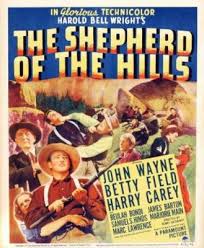
THE SHEPHERD OF THE HILLS
US, 1941, 98 minutes, Colour.
John Wayne, Betty Field, Beulah Bondi, Hary Carey Jr, Marjorie Main, Ward Bond, John Qualen.
Directed by Henry Hathaway.
The Shepherd of the Hills is an excellent western of the early '40s. It was directed by Henry Hathaway who was emerging as a successful action director. He was to work with Wayne in many other films including The Sons of Katie Elder and his Oscar-winning True Grit.
The film is a John Wayne vehicle. Wayne had succeeded in Stagecoach, Dark Command and The Long Voyage Home. He was emerging as a strong star of the '40s. Here he has good support from Betty Field in a charming role. Strong character actors like Harry Carey, Beulah Bondi and Marjorie Main are in the supporting cast.
The film portrays feuding families in the Ozark mountains. It captures the atmosphere of the mountain families, their stances, interactions, violence. The film is attractive in colour (and had been filmed in silent versions in 1919 and 1927).
1. An entertaining western? Picture of mountain families? Feuds? A piece of Americana?
2. Colour photography, the location photography and its beauty? Action sequences? Musical score?
3. The title and its focus on The Shepherd? The stranger inhabiting the mountains? His consideration for people? The revelation that he was Matt's father?
4. The picture of the mountain families? Their homes? Way of life? Work? Flocks? The feuds? The authentic background to the characters and situations? Their credibility?
5. Young Matt and his place in the mountains? His place in the family? Aunt Molly? The love for Sammy Lane? His memories of his father? His mother? Keeping vengeance alive? His work and obsession? The encounter with The Shepherd of the Hills? Friendship? Shared experiences and dangers? The confrontation with The Shepherd? The realisation that he was his father? The Shepherd's explanation? The reconciliation?
6. Daniel Howitt and his life in the hills, his mysterious appearance, the recluse, his way of life, his helping the families, kindness, help in danger? A genial and calm figure? Matt's attraction towards him? Sammy’s attraction to him? His genial guidance of them? The help in the crises? The revelation that he was Matt's father? The years in prison and their effect? Confrontation to reconciliation? An interesting portrait of a saddened man? A reformed and good man?
7. Sammy and her work in the mountains, her love for Matt, her trying to calm his hot-headedness and vengeance? Interactions? Details of their encounter? Her attraction towards The Shepherd? Family life? The final reconciliation?
8. The picture of the mountain families: Aunt Molly, old Matt? The families and their way of life? Characters? Values?
9. Action sequences, confrontations? Genial family pictures? The climax and the reconciliation? A film of warmth and values?
Published in Movie Reviews
Published in
Movie Reviews
Tagged under
Saturday, 18 September 2021 19:25
Shattered Vows
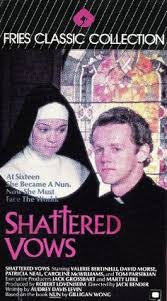
SHATTERED VOWS
US, 1984, 94 minutes, Colour.
Valerie Bertinelli, David Morse, Patricia Neal, Milly Perkins.
Directed by Jack Bender.
Shattered Vows based on a book called 'Nun'. The telemovie title is sensationalist and misleading. This is a good telemovie.
The film focuses on a young girl joining a religious order in 1962. It is on the eve of changes within the Catholic church. The girl moves through her novitiate training, the old style, and then moves into apostolic work., The changes of Vatican II are presented to the order as a challenge. There is heavy-handed clericalism. There is opportunity for further studies. The psychological studies and the open way of life (compared- with the sheltered background of the heroine) give rise to a vocations crisis which is appropriately handled.
The film re-creates in accurate detail the lifestyle in religious orders prior to the mid-'60s. It also highlights accurately the atmosphere of change during the '60s.
The film may be of interest as a human drama for those unfamiliar with the Catholic church or religious orders. For those familiar, the film will offer an interesting insight into the period as well as an accurate memoir.
1. The title of the film? Expectations? The original title of the book?
2. The effectiveness of the film as a telemovie? For a wide audience? A memoir of a particular period in the Catholic church? The issues raised and their treatment for a home audience? For audiences who share understanding and beliefs? For those who don't? A presentation of a period of history in the church for audience understanding and judgment?
3. The autobiographical nature of the film? The author as technical adviser? The voice-over commentary? The persuasiveness of the memoir and the treatment?
4. The response of the audience to the presentation of nuns on screen? The old style Hollywood and sentimental treatment? Treatment of religious women in the '60s? The experience of the changes? The impact of Vatican II? The nuns and their dedicated lifestyle, enclosure, traditions? The work and ministry? Study? Leave of absence? Dispensations from vows? The presentation of the old customs in their detail? Older language, changes of language? A picture of the changes?
5. The theme of vocation: vocation in the Catholic church, the influence on the very young, their going to junior colleges in preparation for joining an order? Experience and lack of experience? Age? The role of parents? The drama of entering the order? Meeting others in the same situation? Separation from family? Mary and her following this pattern? Her brother's hostility on her entrance day? The support of her sister? The pride of her mother and father? Their presence at her religious profession? her relying on her parents, especially her mother, to talk over her vocation? Her mother's concern that she had a vocation and had expectations of her daughter? The portrayal of a Catholic family of the period?
6. The role of Mary's Aunt Agnes: already a nun in the order? Her life in the convent, receiving Mary? Helping her with her formation? The wedding dress for the profession? Her changing with the Council's proposals? Her helping Mary with the dispensation? Offering advice in Mary's emotional crisis? Portrait of a nun who changed?
7. The picture of religious formation at the time, the style of entering the Novitiate, the rules, a young nun as guardian angel, the dormitory and the rules, the conferences and their stern spirituality, study and moving out amongst their contemporaries yet dressed as a nun? The spirituality of the period? Profession, the dress, the cutting of the hair? The first apostolic work, a new community, projects? The effect of this ministry on the young nuns? Visiting children with cakes etc.? The possibility for more substantial ministry?
8. Mary and her personality, her growing up, joining the convent early, her response to formation and her earnestness, discussions with fellow novices, the emotional response to religious dedication, her praying, profession, apostolic work and its implications? The meeting with Father Tim and her admiration for him, liking him? Mutual flirting without their realising? Her response to him as a person, as a man? Job satisfaction? The holidays and the sense of freedom, the change of clothes? Dancing? The permission refused for her to return to her work? The possibility of study? Going to Fordham? The modified habit, the classes, the psychology courses, the volunteer group, the interaction sessions and the questions put to Mary about her life and vocation, the pressure on her? Going to parties, being alone? The effect on her reconsideration of her life? Members of religious orders at Fordham? Advice? Tim and his welcoming her to Fordham, company, friendship? His opening her to wide horizons?
9. The visit to her parents, the discussion about the dispensation, the Novice Mistress and her farewelling her? Wishing her well? The visible changes in the religious congregations? Lifestyles, communities, habits? The importance of the adaptation of the '60s?
10. Mary being alone, free, awkward? The encounter with Tim and his going on retreat, the break with him? Meeting Richard, the dance, her awkwardness? The phone call, the meal, telling him about herself, his leaving, the return, relationship? The sexual relationship? His seeing Tim and her reaction to him? Her anger about the wedding? Seeking her aunt's advice? Presence at the wedding, reconciliation with Tim?
11. The final voiceover and the commentary on her journey, studies, marriage, children? Her respect for the church, the wedding, her telling her children about love?
12. Tim as a young priest of the '60s, his earnestness, work, attraction towards Mary, unwitting flirting? the friendship, study at Fordham, the decision of breaking with Mary? Her accusation: that he was hiding? The wedding and his reconciling with her at the end?
13. The contrast with Richard, friendship, love, relationship, his wariness about Mary being a nun, a transition person in her life?
14. The portrait of the convent, the nuns, the young novices, the one leaving in the middle of the night, the sternness of the Novice Mistress? The changes in the church and their exhilaration? Too much, too soon? People's ability to cope? The effect?
15. The impact of the film on those familiar with its material? For those not familiar?
Published in Movie Reviews
Published in
Movie Reviews
Tagged under
Saturday, 18 September 2021 19:25
Shakedown/ Blue Jean Cop
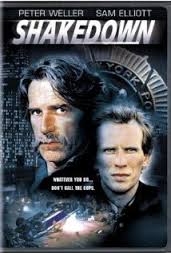
SHAKEDOWN (BLUE JEAN COP)
US, 1988, 112 minutes, Colour.
Sam Elliot, Peter Weller, Patricia Charbonneau, Blanche Baker, Shirley Stoler, John C. McGinley?.
Directed by James Glickenhaus.
Shakedown is a very well-made police thriller, set in New York. It is quite involving, the only difficulty being two stunt sequences which seem to be ends in themselves and exceedingly far-fetched, especially the finale with the plane. However, audiences probably will be carried along, despite the exaggerations.
The film was written and directed by James Glickenhaus, director of The Soldier (and the Sam Elliott character is in a 42nd Street cinema watching a spectacular scene from this film) and The Exterminator which is advertised as its support.
Peter Weller is the lawyer, Sam Elliott does another of his seedy-type genial police. Patricia Charbonneau (the lover in Desert Hearts) is the assistant district attorney.
The film highlights the work of the New York police, police corruption, drug dealing as well as gangsters in the city.
1. Effective police thriller? New York city? Drugs and police corruption? The courts?
2. The New York city locations, Central Park, 42nd Street? Authentic atmosphere? The stunts, the chase through the city, the shoot-outs, the finale With the plane? How authentic? The musical score and atmosphere?
3. The title, the focus on the police, their work, corruption? Glickenhaus and his vigorous style (and the spectacular excerpt from The Soldier seen during the film)?
4. The opening with the dealer, the confrontation by the policeman, their both being shot? The network of police corruption with the dealers? The wealth of the dealers, the clubs and brothels, raids, the holding and destroying of evidence? Easy bail?
5. Roland and his work, taking on Michael Jones's case, the case and the interviews, its being his last job? His living with Gail, the relationship, searching out the apartment, the new job at Wall Street, the influence of her wealthy father? Meeting Susan again, her work in the DA's office, the bond with the past, the strength of his love for her, his declaration, the clash, the nights together, her demands on him? The contact with Richie Marks, his giving the information about police corruption and their use of money? His going to see O'Leary's wife, the discovery of the Porsche? Participating in the raids? The brothel and the club, the 42nd Street shootout, the chase on the back of the bike? In court, the clashes with Susan, the evidence the cross-examination of the car salesman etc? The information about Michael Jones's tape? The police refusing, the broken key? His decision to steal the tape, being caught, held by the police, about to be shot, rescued? Giving the evidence to the judge and her rejection of it? Jo announcing she was pregnant? The dinner with the family, his telling them - wrong timing? A future with Susan? His going back to his Legal Aid job?.
6. Marks and his ragged style, past relationship with Gail, sleeping in the cinema giving the information about crooked cops and their money, his being with the young group, going on the raid? The raid on 42nd Street, the chase of the bald killer, the stunt work and his coming down the light pole, the chase and the crashes? The bond with Roland? His becoming the drug boss's target? Fishing, the chase through the carnival, the roller coaster and the death of the killer? Giving Roland the information about the tape, rescuing him from the police? The honest cop?
7. O'Leary and the plan of the corrupt police, the concealing of the evidence, the wife ringing her contacts, the young thug police and their raids, the murders, their own deaths? The link with the drug boss, the policeman escaping on the plane?
8. The network, informants, murders, the clubs and their toughness, the raids, the drug boss going to court, the million dollars bail, fleeing the country? Poetic justice in the plane explosion?
9. The trial, Roland's skills, the witnesses, Susan and the cross-examination? The 'not guilty' verdict?
10. Susan, yuppy, her work, relating to Roland, her demands on him?
11. Gail, wealth, the apartment, the false pregnancy, the dinner?
12. Themes of justice - abhorrence of the drug dealers, but their not being condemned for crimes they did not commit? Police escaping justice? Police themes, drugs, corruption? The blend of the action spectacular with thematic exploration of law and order?
Published in Movie Reviews
Published in
Movie Reviews
Tagged under
Saturday, 18 September 2021 19:25
Seventh Veil, The
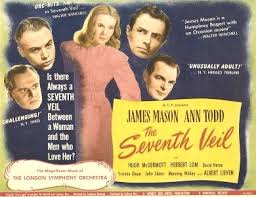
THE SEVENTH VEIL
UK, 1945, 94 minutes, Black and white.
James Mason, Ann Todd, Herbert Lom, Albert Lieven, Hugh McDermott?, Yvonne Owen.
Directed by Compton Bennett.
The Seventh Veil is a psychological romantic drama. The seventh veil refers to those of Salome but is applied to the various veils and masks with which we cover our personality. The seventh veil is the last which reveals our naked psychological self.
This was the era of interest in psychology in film, for example, Hitchcock's Spellbound. Herbert Lom plays a psychiatrist who uses hypnosis to help his patient, a famed concert pianist, to unearth her past and come to terms with it.
The film has a famous performance by James Mason, emerging in popularity in these years with such films as Fanny By Gaslight, The Man in Gray, The Wicked Lady. He is the Svengali-like cousin of the pianist, played by Ann Todd.
The film looks somewhat primitive in its psychology nowadays, but highlights how forceful this was in the past. There is a selection of classical music played by Eileen J6yce. The film was the first directed by Robert Compton-Burnett?, who became Compton Bennett for his role as director. His later films include King Solomon's Mines.
1. The classic status of this film? The British industry of the '40s? Psychology and romance?
2. The British industry in the '40s, black and white photography, Compton Bennett's work as an editor? The musical score, selection of classical themes?
3. The title and its psychological references? To Salome? Psychological honesty and nakedness?
4. The structure of the film: the attempted suicide, Francesca's problems, the hypnosis, the flashbacks? The experiences with the variety of music? The happy resolution?
5. The portrait of Francesca: the attempted suicide, her silence in the hospital, her willingness to undergo hypnosis, her return to being 14 years old, a schoolgirl, alone, her musical talent, out with her friend and late, taking the beating for her friend, pleading for her hands, the trauma of her hands being beaten, failing at the exam? Her going to Nicholas, being in awe of him, the vast house, the servants, bored, her being tricked by Nicholas to play the piano? The collage of her practice, her developing her skills? The encounter with Peter, falling in love, talking, the boat, her proposing (as in films)? Telling Nicholas, his reaction, locking her in, taking her to Europe? The collage of her training in Europe? The debut, the encounter with Susan and her gossip, Francesca's resentment towards Susan? Her performance, the collapse? Nicholas and his power over her, Svengali-like? Relating to her, making all the decisions? Francesca's comment in the voice-over? The build-up to the Albert Hall, her going to Peter, the encounter with him? Nicholas and the discussions with Max about the portrait? Her getting her portrait painted, flirting with Max and tantalising him? The cane across her fingers and the reaction? Her freedom, going with Max? Her silence, the attempts at cure by Dr Larsen? The music? Her playing under hypnosis? The memory of her hands being beaten. The build-up to the three men arriving? Peter's music being played? Her playing the piano? Her cure? Going to Nicholas?
6. James Mason as Nicholas: austere, the family background, his mother's departure, taking Francesca as his ward, his harsh treatment of her, exercising his power, making her play? His dropping his guard and being charming and her responding to him? The reaction to the engagement, taking Francesca to Europe? His knocking on her door and her reaction? The new encounter with Peter, the encounter with Max, the portrait?
Smashing the cane on Francesca's hands? The reaction to Dr Larsen? The end and the loving reconciliation?
7. Dr Larsen, his skills, the hypnosis, the questioning of Francesca, his explanations, going to Peter, going to Max, going to Nicholas and discovering the truth? His experiments with the music? The hospital staff?
8. Peter, his American background, training, pleasant, the band, the proposal, the dance music, his own marriage and divorce, present at the end?
9. Max and his disdain, decision to paint Francesca, the scenes between the two, falling in love, persuading her to leave, the crash?
10. The romanticism of the film? The psychological atmosphere? Their blending?
11. Portrait of men and women, moral stances, careers, skills, needs? Psychology and resolution?
Published in Movie Reviews
Published in
Movie Reviews
Tagged under
Saturday, 18 September 2021 19:25
Sing
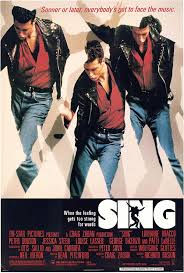
SING
US, 1989,98 minutes, Colour.
Lorraine Bracco, Peter Dobson, Jessica Steen, Cuba Gooding Jr, Louise Lasser, George DiCenzo?, Patti LaBelle?.
Directed by Richard J. Baskin.
Sing is a Brooklyn story. It is in the vein of the educational films like To Sir With Love, Up the Down Staircase, Lean on Me. The film is also one of those minorities put on the show which date back to the 30s and such films as Babes in Arms.
While the plot is old-fashioned, so is the sentiment. The film focuses on minorities in Brooklyn and the pressures on them by authorities. The community stands up for its rights. It also shows the contemporary drug world - and the possibility of people being redeemed if they are given the chance.
The film is geared particularly for an American audience. It is not particularly startling - but has some verve, especially in the exuberant production of Sing.
1. Enjoyable education story, putting on the show? in the tradition of Fame?
2. The picturing of Brooklyn, the neighbourhoods, the deserted and ugly streets, the racial groups? School, homes, cafes? Images? Special pleading for Brooklyn?
3. The music, the songs, the choreography, the show?
4. The age old story, Audience expectations? The transformation of the hero? A film of hope?
5. The credits, and Brooklyn, his dancing, the neighbourhoods? Hannah, the bottle? Theresa and her being mugged? The irony of Dominic being the mugger?
6. The party, introductions, the feeling? Hannah and Michael and their break-up, Hannah's sadness? Her mothers pressurising, her, concern? Theresa and her return to the neighbourhood, her loyalties?
7. Education and Brooklyn Central: The principal and his concern, Felicia and her cynical attitudes? The kids and their disregard - manner, clothes, way of speaking? Ignoring Theresa? The tradition of the Sing? The elections?
8. Theresa as being part of the neighbourhood, going away and coming back? Identifying Dominic? The confrontation, her hold over hi.in? Friendship with Hannah, the auditions? Confrontation with Dominic? The practices for the Sing, her work with Dominic, dancing with him, a place in the school, the closure, the triumph of the Sing?
9. Dominic as tough, Theresa, his relationship with his brother Freddie, drugs, crime? Freddie and the jobs? Sleeping through the auditions? His being elected and dominated by Theresa? His taking over - his friends, their performance? The choreography for the Atlantis number? Going to the nightclub with Hannah to study the choreography, dancing with her, kissing her? The robbery, hurt, hurting Hannah? Offering to pay back the money? His actually returning it? The final dancing, with Theresa? Being bashed? The finale, the final performance - transformed? (How credibly)?
10. Hannah, her age, experience, in the neighbourhood, the absent father, the family, her mother, at work? School- friends? Relationship with Michael and the break-up? Tension With Dominic? The Sing, her election, the auditions, the performance? Going with Dominic to the nightclub, seeing Michael? Siding with Dominic after the robbery? her mother's hostility? Being hurt, giving her the tickets? The finale and her mother arriving?
11. Hannah's mother, hurt, her boyfriend, work, the robbery, not going to the Sing, the tickets - her final arrival and the reconciliation?
12. The school staff, the principal and his concern, defying the authorities, Felicia and her cynical attitudes, her performance in the Sing? The meeting about the closure of the school? The educational authorities? The defiance of the parents? Locking the official in the basement during the performance? The policeman taking sides against him?
13. The various parents, the large mother and her pride in her daughter?
14. The sketch of the kids, rehearsals? The performance and the competitiveness? The school song?
15. The world of Brooklyn: Attitudes, neighbourhood in decline, the building up of community, crime, the police, drugs? Positive outlook?
Published in Movie Reviews
Published in
Movie Reviews
Tagged under
Saturday, 18 September 2021 19:25
Shell Seekers, The
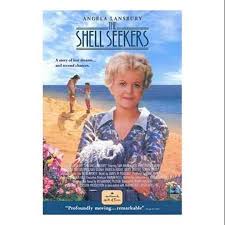
THE SHELL SEEKERS
US, 1989, 102 minutes, Colour.
Angela Lansbury, Patricia Hodge, Sam Wanamaker, Sophie Ward, Dennis Quilley, Irene Worth, Michael Gough.
Directed by Waris Hussein.
The Shell Seekers is a fine telemovie based on a novel by Rosamund E Pilcher. It was adapted for the screen by playwright John Piehlmeier, author of Agnes of God. It is a star vehicle for Angela Lansbury who is excellent as a British matriarch, coping with getting older, remembering her past, trying to understand and care for her children.
The supporting cast includes Sam Wanamaker as a friend from the war years, Patricia Hodge is her daughter, Dennis Quilley her friend and Sophie Ward is her youngest daughter. The film is well written, well performed, has insight into family relationships and tensions.
1. Portrait of a woman? Family? Characters and situations?
2. The British background, English city life, the Cornwall sequences and their beauty? The 80s and the 40s? The musical score?
3. Angela Lansbury and her portrait of Penny, her screen presence? in hospital, discharging herself? Her dreams, memories of painting, of her childhood, of her father? The Shell Seekers and the other paintings? The importance of his art? Its significance for her? Seeing her at home, working? Her worry about Nancy and George? Noel and his ambitions? The dinner, her wanting to wash up etc? The taunts from Dolly? Her observation of her spoilt grandchildren?
4. Their age, her experience, her need to search? Going to Spain, enjoying the visit with Olivia and Cosmo, the sun, the boat, talking? Friendship with Antonio? Sharing perspectives with her? Discussions about Olivia and her future, her choices? The news of Cosmo's death? Grief? Having Antonio to stay? Becoming a daughter? Danus and his working in the garden?
5. The paintings and their value, the reaction of Noel, of Nancy and George? Pressure on their mother? Self-centredness? Noel's resentment? Dolly and her sneers? Noel overhearing his mother and Dolly speaking, his mother's regrets and seeing him in the image of his father? They're coming to clear the attic? The truth about the paintings and sketches?
6. Penny wanting to go to Cornwall? Nancy’s refusal and fear? 0livia being too busy and her regrets? Antonia and Danus agreeing, Danus's hesitation? The happiness of the visit, the beauty of the sea, the town? Memories? The time when she was alone with Nancy? Memories of Richard and her love for him? The war, Ambrose missing in action, the truth about Ambrose and his gambling? Her choice to stay with him? A good mother to her children?
7. Antonia and Danus, working for Penny, in the household, their meetings, Danus's reserve? The news about his epilepsy? His fears? His distancing himself from people? Antonia, attracted to him, together? The crises in Cornwall? The engagement, happiness, Olivia giving the earrings to Antonia? The marriage?
8. Penny and Richard, the chance encounter in Cornwall, the memories, the sharing, the journey of their lives?
9. Penny and co concerned about her children, them, wanting their happiness? The truth about seeing herself as a Mother, forgiving to Noel? His resentment? Nancy and her frustrations? Spoiling her children and sending them to expensive schools etc? The pressure of George? Making Nancy hear the truth? Olivia and the bond with her mother, her job and ambitions, her support of her mother?
10. The wedding and the happiness, the reconciliation? Everybody present? Their understanding their mother? The selling of the paintings, her giving the paintings to the Art Gallery, giving them financial support? But her wanting them to make their own decisions? Portrait of people and human nature?
Published in Movie Reviews
Published in
Movie Reviews
Tagged under
Saturday, 18 September 2021 19:25
She-Devil
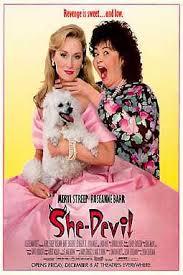
SHE-DEVIL
US, 1989, 99 minutes, Colour.
Meryl Streep, Roseanne Barr, Ed Begley Jr, Lilnda Hunt, Sylvia Miles.
Directed by Susan Seidelman.
She-Devil is based on Faye Weldon's celebrated novel, The Life and Loves of a She-Devil. It was dramatised by British Television as miniseries in the mid 80s. Here it is adapted for a New York situation and Americanised.
It is a stylish blend of domestic comedy and satire. The film gives Rosanne Barr, famous for her television series in the late 80s, an opportunity to move to the big screen. She relies on her image of the large and somewhat ugly woman - who nevertheless is vindicated. She is contrasted with Meryl Streep, appearing at her most beautiful and elegant. Streep's satire of a character who writes pulp romantic novels is superb with excellent timing and gesture. Ed Begley Jnr is good as the callow husband, caught up in an affair, and betrayed by his vengeful wife. The supporting cast includes Sylvia Miles as Streep's gruff Mother and Linda Hunt as a nurse who helps Barr with her revenge.
The film is visually striking, has humorous musical background and songs, has a great deal of witty and spoof dialogue. It may not be everybody's enjoyment - and might tend to take it far too realistically. It is something of a companion piece to The War of the Roses, the black comedy with Michael Douglas and Kathleen Turner, which was released at the same time.
Direction is by Susan Seidelman who made such amusing comedies as Smithereens, Desperately Seeking Susan, Cookie.
1. Comedy, Satire, Spoof? Family themes? Relationships?
2. The New York settings, the countryside? The ordinary compared with the Fashionable and the affluent? The importance of colour and design, pinks and pastel? Decor, clothing? The musical score, the satirical songs?
3. The credits: satin and fire, creating a mood?
4. The stylised nature of the film: Ruth's voiceover and the tone of her commentary? Audience sharing Ruth's perspective - or not? The importance of editing and the mood between the various characters and the comments on each of the characters by the other? The design, posturing? Dialogue and humour? The special effects to make it more stylised - Ruth and Hooper painting the office? The focus on Ruth's list? The final glint in Ruth's eye?
5. Rosanne Barr's presence and style as Ruth? Her commentary on herself and her beauty and ugliness, her size? Her need for beauty treatment? Her comment on Mary Fisher, on Bob? The audience continuing to hear her perspective on what was going on? Looking at her list? The opening, the unkind looking at her face and figure? Going in for facials, watching Mary Fisher on television? Ringing Bob, going to the social event, her awkwardness, spilling the wine, the effect on her, in the car? Waiting through the night, theories about Bob's lateness, reaction to his return? Seeing her at home with the children?
6. The build up to his parents' visit, the cooking and her failures, her failing with the tray, the food and the dead rat, angers, humiliated by Bob, announcing that Mary Fisher was his mistress? Audiences taking sides?
7. The presentation of Mary Fisher and her glamour, the TV program, the homes of the rich and famous? How unreal character did she seem? Made up, manner, walking in style, clothes? Her home? Pink as her favourite colour? Her novels, their reputation? Her age and lying? Her mother and the home? The party, the encounter with Ruth, falling in love with Bob, his driving her home, the introduction to Mary and whether audience sympathies were with her or not?
8. At home, Garcia as the butler, his appearance, reactions? Bob and the affair? Bob's lies? Her making him her accountant? The conduct of the affair, the bed, the pool? The kids and Ruth's arrival?
9. Ruth leaving the kids with her, their mess, load, on the phone, the dog, and its leaping over the cliff (and her funeral for it)? The meals and the behaviour? Her becoming more domestic, the laundry and the bleach? Garcia and his laziness? The maid and her angers? Garcia dancing with the kids? Her decision to put her foot down and demand discipline?
10. Mrs Fisher at the home, sedated, becoming lively with Ruth's help, her attitude to Mary, the arrival at the front door, her bluntness, behaviour at meals, her laughter, her interview with the magazine people and revealing the truth about Mary's age, the baby son? Her being ousted from the home and having to stay with Mary?
11. Ruth and the effect of the situation on her? Becoming a she-devil? Her revenge, her plan, burning the house down, dumping the kids with Mary and Bob? Becoming a nurse, going Into the home, the interview with the superintendent, becoming friendly, changing the pills, persuading the old women to play games? Friendship with Hooper, the temptations of the cakes? Her name of Vesta Rose? leaving with Hooper? Investing the money, cleaning up the old building, making an office, the satire on the TV commercials about opportunity for women like Hooper? The women clients, the Chinese lady going to the courts, seeming glamorous after Bob - the advertisements? His reading the advertisement? his office, Ruth egging on the girl? Her falling in love, her relief? Infiltrating the office, changing the computers, Jackie Collins accounts? Mary's account? The setup for his loss of freedom? Sending the photocopy of the sex encounter to Mary?
12. Mary and the change, her mother, attitude to Garcia? Discipline? The book: Love and the Romance Cycle? her agent's rejection and her scene in the restaurant? Her trying to keep her composure? The expose? Publishing the novel, no autographs? The clash with Bob? His behaviour, her seeing the photocopy? The party, and all the glamorous guests? Bob behaving, his speech - and arrest?
13. Bob and his character, weak, a stereotype of the fickle male? The girls, going to the lawyer? Mary dismissing him? The trial, the setup for the Judge? Ruth changing the judge? The sentence, going to prison, his life there, learning to cook? The visit of the kids? Ruth? His hopes for being letting out? Reform?
14. Ruth and her revenge, the transformation, her self-image, improving herself? Going for the autograph, the irony of Mary writing thanks? The glint in her eye? A future with Bob or not?
15. Mary, the new book, her changed appearance, the TV interviews, signing of the autographs - changed situation for her? Improvement?
16. A cautionary tale of love, family, relationships, betrayal, career, pretentiousness and truth?
Published in Movie Reviews
Published in
Movie Reviews
Tagged under
Saturday, 18 September 2021 19:25
Shaggy Dog, The
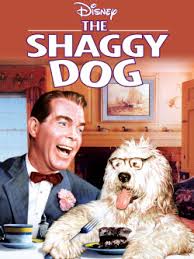
THE SHAGGY DOG
US, 1959, 104 minutes, Black and white.
Fred Mac Murray, Jean Hagen, Tommy Kirk, Annette Funicello.
Directed by Charles Barton.
The Shaggy Dog was a very popular Disney film of the late19 50s. In black and white, it nevertheless took audiences' fancy. rather silly in its way: the average American way caricatured, Fred Mac Murray as an idiot father-postman, Jean Hagen as a rather dumb, yes-saying mother. Tommy Kirk and Kevin Corcoran, veteran of many Disney films, were the sons.
The film shows life in the American town - but there is a variation with an espionage plot. There is also a plot where the absent minded son played by Kirk turns into a shaggy dog - and out again. The film is leisurely paced, sometimes makes a great deal of its dog jokes (with Kirks' voice, in pyjamas and cleaning its teeth, driving a car etc.) Direction is by Robert Stevenson who directed many Disney films including some of its most successful, including Mary Poppins.
1. Entertaining, comedy, farce? Fantasy, the animals? The espionage plot?
2. Black and white photography? Ordinary America, stunts and special effects? The musical score?
3. The title, introduction with the Shaggy dog story? The film as a film of the 1950s? Made with a low budget The plot outline? the shaggy dog itself?
4. The basic situation: the family, the American family? Dad as the parent, never seeing him at work? His irritability, treatment of his children, of Frieda? Frieda as the obedient wife, her shrewdness at times? Handling the situations? Wilby and Moochie? Wilby and his experiments, the rocket? His father severe on him? Moochie as the young boy and his role in the family? Genial American family, Wilby, misunderstood, his father's severity, having to get rid of everything? Buzz and the rivalry with Alison? The attraction to Francesca? Going out, tending Ruzz money? The visit to the museum, the discussion with the Professor; taking the ring, going home, repeating the formula, the spell and his gradual turning into the dog? Coping with Moochie, avoiding his father, getting some food? The adventure as a dog? Being hidden in the cupboard, getting out? His overhearing the plot? Turning into a dog at the dance? Telling Moochie, going back to the house, turning back into himself, hidden, back again to the dog, rescuing Francesca? Buzz taking the credit? Their fight? The humorous touches, the dog doing human things, driving the car, telephoning? The reaction of the police? and himself being abandoned by Alison?
5. Wilson Daniels and Fred McMurray's comic style, the idiot father, awkward, poked fun at? Treatment of his family? His reaction to dogs and his allergies, all in the mind, relationship with his wife?
6. The incident with the dog collar getting the gun, being persuaded of the truth by Moochie, going to the police, the psychiatrist, and his seeming more idiotic? The grand finale and his heroism, being photographed with the dog? Frieda as the obedient wife, love for her children, her husband?
7. Francesca and her father, coming to the neighbourhood, attracting the boys, their speaking broken English? At school, outings, at the dance? The rivalry with Alison? Her relationship with her father, finally being kidnapped, failing overboard, rescued by Tilby?
8. The spies, in the ordinary American town, the museum? the art pieces? The servant? The contact from the factory? Plans, adaptations, getaway and chase? The credibility of the espionage? The role of the local police?
9. The police, the men on the beat, the policeman seeing the dog, not believing, the dog driving the car? The officers and the espionage, the psychologist?
10. The professor, his exhibition, explanation of the spell, making it credible?
11. The boy around town, rivalry with Alby, taking Alison out? His comeuppance?
12. Popular ingredients, television situation comedy style? The popularity of this Disney film?
Published in Movie Reviews
Published in
Movie Reviews
Tagged under
Saturday, 18 September 2021 19:25
Shadow Riders, The
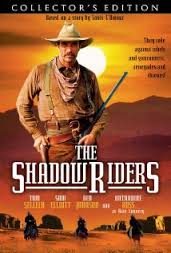
THE SHADOW RIDERS
US, 1982, 100 minutes, Colour.
Tom Selleck, Sam Elliott, Katharine Ross, Ben Johnson, Geoffrey Lewis, R.G. Armstong, Jane Greer.
Directed by Andrew V. McLaglan?.
The Shadow Riders is a telemovie based on a western novel by Louis L'Amour. With the same stars as the mini-series, The Sacketts, based on a L'Amour story, it seems to be something of a sequel. The Civil War has ended. Geoffrey Lewis is the Commander of a Southern Troop who wants to wage the war and kidnaps men and women from a Texas town to sell them into slavery. Tom Selleck and Sam Elliot are brothers, from opposite sides in the war, who return to pursue and rescue their families. Also in the cast are Ben Johnson enjoying himself as the basically Uncle Jack, and Katherine Ross as the heroine (real life wife of Sam Elliott). The film, is directed by Andrew McLaglen?, veteran of many action features and westerns.
1. Entertaining western? The aftermath of the Civil War? The history of Texas?
2. The location photography, the atmosphere of the 1860s, of Texas? Special effects and stunts? Musical Score?
3. The title, the theme? The two brothers, opposite sides of the war, peace? The pursuit and rescue?
4. The opening, the Civil War, executions? Mac and his surviving the war? Del and his being about to be hanged, rescued by the major? In further difficulties and rescued by Mac? The forgetting of the past? The major and his wanting to continue the war and the way of life of the South?
5. The two brothers, their relationship? Coming home together? Meeting their Mother and Father? The situation in the town? The decision to pursue the kidnappers? Travelling together? Reflecting on their lives? Del and his disappointment that Kate was engaged? Finding Jessie? The plan with Uncle Jack, the prison, dynamite? Going to the camp, the infiltration of the camp? Kate's being taken? The plan, Uncle Jack and the explosion? Taking the slave dealer prisoner? The pursuing Sheriff, bargaining Uncle Jack for the slave trader? Returning home Del with Kate? Mac to run for Sheriff? Portrait of Texas men?
6. Kate and the women, captured, Kate's leadership, giving the knife to Jessie, her contacts with the Major? Being sold to the dealer? The rescue? returning as the nun, caught? The final mission? Her confrontation of Del, wanting to be asked to marry? The happy ending? The sketch of the sisters and the other women captured?
7. The major, the aftermath of the war, the gentlemanly way of life, the rebel? Clash with Del after rescuing him? Confrontation with Kate? The gun deal, the betrayal, his escape? Del's saving his life? His followers? The Mexicans?
8. The dealer and slave trader? Dealing with the major? The proposition? his luxury train?
9. Jack, in prison, his laconic style, his crimes, the Sheriff pursuing him? His plan for the future? The final bargain?
10). A picture of Texas, the frontier, war and danger, slavery? An enjoyable western?
Published in Movie Reviews
Published in
Movie Reviews
Tagged under